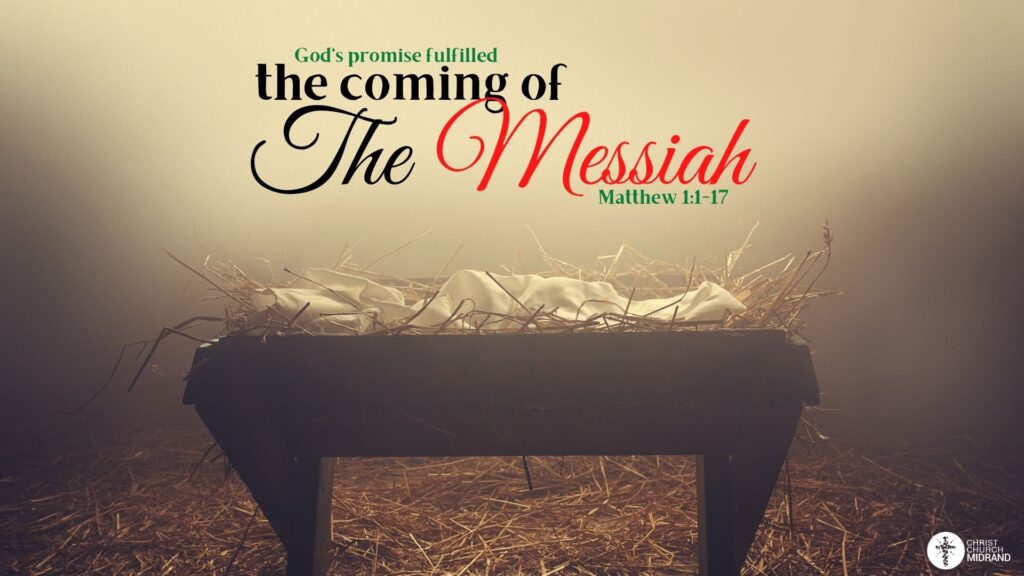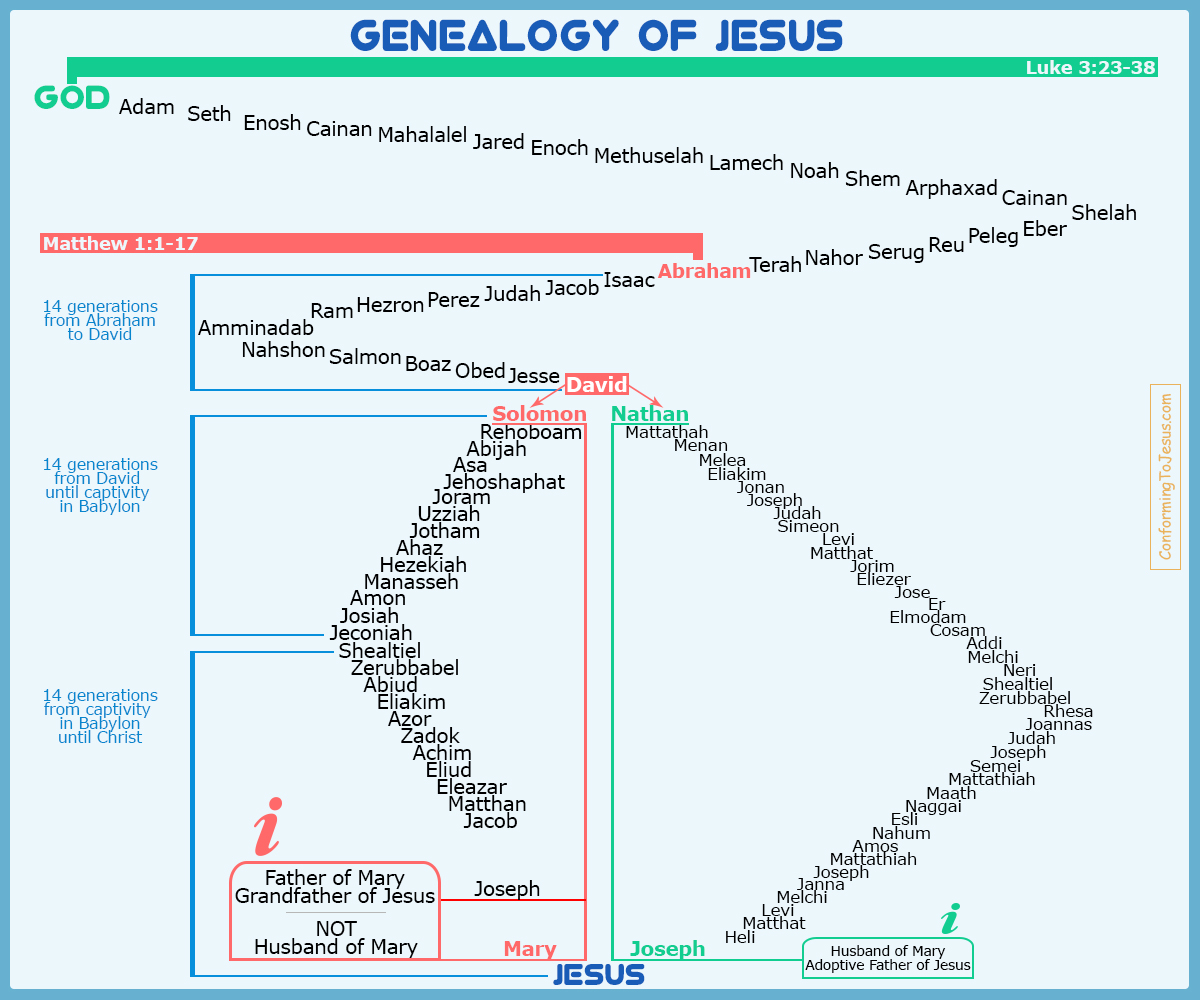
Ever since the fall of Adam, God spoke of a Redeemer who would come. God said He would come to crush the head of our adversary, the Devil (Genesis 3:15). The Scriptures portrayed a Redeemer, from the line of David, who would reign forever (2 Samuel 7:12-13). Yet, He would also have to die for His peoples iniquities (Isaiah 53:5,7-8). This paradox mystified the Jews and they rejected Jesus. They weren’t looking for a Messiah who had to first die and then rise again to live and reign forever.
Why the genealogy of Jesus matters

The gospels of Matthew and Luke record two genealogies for Jesus. Matthew’s gospel presents Jesus’ genealogy from the perspective of His kingly heritage. It begins with Abraham and traces the line through David, Solomon, and up through Joseph, the husband of Mary. (See Matthew 1:1-17.) Matthew wrote to show Jewish readers how Jesus fulfilled Old Testament prophecies. Jesus inherited the legal right to the throne of David through Solomon.
Luke traces Jesus ancestry backwards to David’s son Nathan and then all of the way back to Adam. (Scholars generally agree that Luke recorded Mary’s genealogy.) If Jesus is truly human, then He must have descended through Adam. (See Luke 3:23-37.)
Genealogies were very important to Jews. They prove that Jesus had the legal right to rule Israel and that He was truly human. He would later prove He had the power of God to do the work of the Father. Not only did God send Jesus to us, He sent the Son of God (John 1:1-2).
The redemptive plan of God before the world was created
Before God formed the world, He knew the whole world would be a prisoner of sin (Galatians 3:22). And yet, God chose a particular people for Himself, who would be redeemed from the curse of the Law (Ephesians 1:4-6, Galatians 3:13). These people would be a love gift from God the Father to God the Son. As God’s only Son, Jesus would be the redeemer who would come down to earth from heaven to save His people from their sins. He willingly took upon Himself the punishment for sin that we deserve and His perfect righteousness is credited to our account.
Jesus declared that all who come and believe in Him would never go hungry or thirsty. He also said, all that the Father gives Him will come to Him, and He will never drive away anyone who comes to Him. Jesus came to do the Father’s will, and the Father wills that no one He gives to the Son will be lost. But everyone who believes in the Son shall have eternal life, and the Son shall raise him up at the last day. (See John 6:35-40.)
The fall of man and the covenant of grace
God created Adam as the first human being and placed him in the garden of Eden to work it and take care of it. God made all kinds of trees for the garden from which Adam could eat. But in the middle of the garden were the tree of life and the tree of the knowledge of good and evil. And God told Adam that he could eat of any tree except from the tree of the knowledge of good and evil. For when he eats of it, he will surely die (Genesis 2:15-17). Later, God formed Eve out of Adam’s side.
Sin and the downfall of the human race
The Devil used a serpent to entice Eve to eat from the forbidden tree, and she ate. She then gave some to Adam to eat, and he ate it too. This was the first act of sin of the human race. God created them in a state of innocence, but they had the ability to choose to sin or not to sin. So, God place them on a probationary trial, to test their willingness to obey.
Adam’s sin affected the entire human race. He was our human representative, and every descendant of Adam would be born with a sinful nature as a consequence of God’s judgment on sin. This is what we call original sin. As a result of original sin, the Bible declares, “For all have sinned and fall short of the glory of God, and are justified freely by his grace through the redemption that came by Christ Jesus” (Romans 3:23).
God’s grace and Messiah’s victory over Satan
Since mankind is no longer able to keep from sinning, God graciously chose to send His Son, in our place, to perfectly keep the Law that we’re unable to keep on our own. And God sent His Son to pay the penalty of death for our sin (Romans 6:23). God gave the first hint of His plan of redemption when He cursed the Devil. God said, “And I will put enmity between you [Satan] and the woman [representing all mankind], and between your offspring [his agents] and hers [the Messiah]; he will crush your head, and you will strike his heel” (Genesis 3:15).
Jesus decisively triumphed over the Devil and fulfilled this prophecy at Calvary. In turn, Satan would bruise the Messiah’s heel through the crucifixion that led to death, but not ultimate defeat.
God’s promise to the patriarchs (Abraham, Isaac and Jacob)
Abram receives God’s blessing
God sovereignly chose Abram, later named Abraham, to father a nation through whom the Messiah would come. God called Abram to leave his country, his family, and his father’s house to go to a land God would show him. He told Abram that He would make him into a great nation and make his name great. He would bless those who blessed him and curse those who cursed him. And He would bless all the peoples on earth through him, which points forward to Jesus Christ who would be Abram’s descendent (Matthew 1:2, Luke 3:34).
Isaac receives the blessing God gave to Abraham
Isaac, the only child born by Abraham and his wife Sarah, inherited the blessing given to Abraham. God appeared to Isaac and said, “… I will be with you and bless you. For to you and your descendants I will give all these lands and will confirm the oath I swore to your father Abraham. I will make your descendants as numerous as the stars in the sky and will give them all these lands, and through your offspring all nations on earth will be blessed, because Abraham obeyed me and kept my requirements, my commands, my decrees and my laws” (Genesis 26:3-5).
Jacob receive the blessing God gave to Abraham and Isaac
Isaac had two twin sons, Esau and Jacob. Though Esau was the older son, God chose to pass the blessing He gave to Abraham and Isaac onto Jacob. Through Jacob’s and his mother’s deceitful scheme, Isaac unknowingly gave his blessing to Jacob. Isaac later sent him away to find a wife from among the daughters of his mother’s brother, Laban.
On his way to Haran, he stopped for the night at a place he called Bethel. There, he had a dream in which he saw a stairway from earth to heaven and the angels of God ascending and descending on it. At the top of the stairway stood the LORD. He said, “I am the LORD, the God of your father Abraham and the God of Isaac. I will give you and your descendants the land on which you are lying. Your descendants will be like the dust of the earth, and you will spread out to the west and to the east, to the north and to the south. All peoples on earth will be blessed through you and your offspring …” (Genesis 28:13-14).
Jesus fulfills God’s promise to bless all the peoples on earth
Of all the people in the world, Jesus was a descendant of Abraham, Isaac, and Jacob. He fulfills God’s promise to the patriarchs that all peoples on earth would be blessed through Him.
The apostle Paul wrote, “For he himself is our peace, who has made the two [Jews and non-Jews] one and has destroyed the barrier, the dividing wall of hostility, by abolishing in his flesh the law with its commandments and regulations. His purpose was to create in himself one new man out of the two, thus making peace, and in this one body to reconcile both of them to God through the cross, by which he put to death their hostility” (Ephesians 2:14-16).
Moses’ prophecy
No prophet has risen in Israel like Moses. He did all the miraculous signs and wonders the LORD sent him to do in Egypt. In the book of Deuteronomy, Moses predicts that a future prophet would come who would be like him. He would come from among the people and would lead them in all that God had commanded (Deuteronomy 18:15, 17-19).
The New Testament clearly identifies this prophet as Jesus. Peter preached to the people in Jerusalem and told them, “Repent, then, and turn to God, so that your sins may be wiped out, that times of refreshing may come from the Lord, and that he may send the Christ, who has been appointed for you–even Jesus. He must remain in heaven until the time comes for God to restore everything, as he promised long ago through the prophets. For Moses said, “The Lord your God will raise up for you a prophet like me among your own people; you must listen to everything he tells you. Anyone who does not listen to him will be completely cut off from among his people” (Acts 3:19-23).
God’s promise of an everlasting heir to the throne of David
King David was Israel’s second king. During a time of peace, David let Nathan know that he intended to build a house for the ark. At first, Nathan told David to go ahead and do it for the LORD is with David. But the Lord had different plans. He told Nathan that He would make David’s name great, like the names of the greatest men of the earth.
“…The Lord declares to you [David], that the LORD himself will establish a house for you: When your days are over and you rest with your fathers, I will raise up your offspring [Solomon] to succeed you, who will come from your own body, and I will establish his kingdom. He is the one who will build a house for my Name, and I will establish the throne of his kingdom forever. … Your house and your kingdom will endure forever before me, your throne will be established forever” (2 Samuel 7:11-13, 16).
Now, we see how Jesus’ genealogy qualifies Him to reign forever on the throne of David and his son, Solomon. (See Matthew 1:6-7)
Jesus came to save sinners
The Bible declares that everyone needs salvation because all have sinned (Romans 3:23). And the consequences of sin is death (Romans 6:23). But the good news is Jesus Christ died for our sins. “But God demonstrates his own love for us in this: While we were still sinners, Christ died us” (Romans 5:8).
Nevertheless, we have to trust in God’s promise to save us, “for everyone who calls on the name of the Lord will be saved” (Romans 10:13). Once we are justified by faith, we have peace with God through our Lord Jesus Christ (Romans 5:1).
Ask yourself two very important questions. First, are you sure that you’ll go to heaven when you die? Secondly, are you certain why God should let you into heaven? If you don’t know for sure, you can settle that matter today. Visit my post, How to Begin Your Life Over Again and you’ll know where and how you’ll spend eternity.
And for crystal clear YouTube presentations of the gospel message from several trusted sources, click here